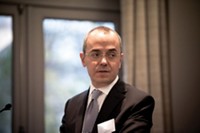Advertisement
Grab your lab coat. Let's get started
Welcome!
Welcome!
Create an account below to get 6 C&EN articles per month, receive newsletters and more - all free.
It seems this is your first time logging in online. Please enter the following information to continue.
As an ACS member you automatically get access to this site. All we need is few more details to create your reading experience.
Not you? Sign in with a different account.
Not you? Sign in with a different account.
ERROR 1
ERROR 1
ERROR 2
ERROR 2
ERROR 2
ERROR 2
ERROR 2
Password and Confirm password must match.
If you have an ACS member number, please enter it here so we can link this account to your membership. (optional)
ERROR 2
ACS values your privacy. By submitting your information, you are gaining access to C&EN and subscribing to our weekly newsletter. We use the information you provide to make your reading experience better, and we will never sell your data to third party members.
Business
Sanofi, Genzyme Come To Terms
Acquisitions: For $20 billion, French firm nets a biologics pipeline
by Rick Mullin
February 21, 2011
| A version of this story appeared in
Volume 89, Issue 8

Ending a nine-month standoff, French drugmaker Sanofi-Aventis has agreed to pay $20.1 billion for Genzyme, the U.S. biopharmaceutical pioneer. Sanofi will pay $74.00 per share in cash. The company has also agreed to contingent value right (CVR) payments of up to $14.00 per share based mostly on the success of Genzyme’s Lemtrada, a multiple sclerosis drug in Phase III clinical trials.
The deal is the latest in a string of big drug acquisitions since 2008 and the largest biologics deal since Roche’s $46.8 billion purchase of the rest of Genentech in 2009. Genzyme will give Sanofi a sizable biopharmaceutical business plus a leg up in developing therapies for rare diseases.
The U.S. firm became vulnerable to a takeover after it encountered manufacturing problems in 2009 at its Allston, Mass., plant. The problems resulted in shortages of its Gaucher disease drug Cerezyme and a $175 million fine by the U.S. government.
Genzyme accepted the offer with CVR payments after rejecting Sanofi’s original bid of $69.00 per share, saying it was inadequate.
“This transaction will create a meaningful new growth platform for Sanofi-Aventis while expanding our footprint in biotechnology,” says CEO Christopher A. Viehbacher. “The CVR structure, which served as an important value bridge between our two companies, rewards both Genzyme and Sanofi-Aventis shareholders, particularly if Lemtrada outperforms the market’s current expectations.”
Andrew Badrot, head of the consulting firm CMS Pharma, sees Sanofi following the lead of Pfizer, AstraZeneca, and Eli Lilly & Co., all of which built biotech businesses through major acquisitions. He notes that the French firm is facing the loss of patent exclusivity on one of its only biologic drugs, the diabetes treatment Lantus, in 2014.
Still, Badrot questions whether the deal will ultimately benefit Sanofi. He notes that Sanofi is buying Genzyme for nearly five times the biotech company’s annual sales, whereas the industry average for acquisitions in 2010 was 3.5 times sales. “If Lemtrada kicks in, that could be $2 billion to $3 billion in additional sales each year over the next five to 10 years,” he says. “If that product doesn’t go through, they will be in trouble.”




Join the conversation
Contact the reporter
Submit a Letter to the Editor for publication
Engage with us on Twitter